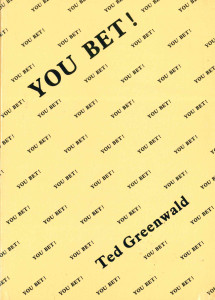
I was in New York for a purpose—for one thing, I had not been for a while and it was time to catch up. At a conference in Boston, I received a phone call from Kit Robinson, in the middle of a session on surrealism no less, that Ted Greenwald’s health was failing. I made plans to visit as soon as the semester was over; a day was arranged, a plane flight, a hotel booking, and other appointments fell into place. I’ve outlined what I did over the four-day weekend here. The time was specified for 2 P.M. Ted was chipper over the phone: “I have an earlier appointment, but I can see you then.” He books his time like a New Yorker, I noted; I don’t, in some unstated way assuming every event is its own uniqueness, even if that has long since become unworkable as a way to manage time. (So it came to pass that I work the day shift on the assembly line of Modernity Inc., headquarters in Detroit. But what’s the difference? Differing cultural styles of time management all depend on the same passage of time.) I was nervous about the event; he had not overprepared it. His daughter Abigail, back from college to help out with the family, answered the door—to apartment clutter, kitchen in the background, bookshelves and wardrobes, heated and stuffy for early spring. Ted’s on the couch, various oxygen-supplying machines in evidence. Ted was a heavy smoker, I recall from numerous occasions. He could not keep his hands away from the next cigarette, one after the other. I don’t want to recall the many times I thought, “Stop doing that, what are you doing to yourself, you’ve got to quit!” I don’t want to make that the dominant theme of my memory of our visit, but there it is. Let us pause for an ethical discussion right here, of what anyone can say to another about the choices they make (or cannot make—such is the nature of dependency or addiction). So it’s about language: how one talks, and the way that talk is embodied—as an ethics. It requires breath to make language, so there is the relation to smoking. Ted talks miraculously, evenly paced and without pressure, acknowledging his physical condition but with a gracefulness of his own distancing from it. Occasionally it becomes more obtrusive: coughing, bodily interruption, need for inhaler. Early on he declares, “I’m 73 years old,” but the time passes regardless. We talk poetry, politics, family, and small talk—this will not be an extended or deep session. On poetry, Ted wants me to think of his work as having made a turn (a Heideggerian Kehre?) in the mid 80s. I’m not altogether clear on that: my knowledge of his work begins with The Licorice Chronicles, one of the unacknowledged masterpieces of American experimental writing, and centers around the numerous pieces I published in This, as well as the single-volume language-centered epic, You Bet! (I also knew his work extensively from producing the early collection Common Sense, now reprinted by Wesleyan UP, and provided a blurb for uncollected work from the same period, published as The Age of Reasons). We discussed You Bet!, the dedicated typographic design of which Ted particularly liked. I was interested in the dynamics of repetition and variation in that work, and tried to visualize it through a “cut and paste” repetition of the title phrase in spaced, diagonal lines across the cover, interrupted by a typographically larger instance of the title, as if to say it is only a matter of emphasis whether the language we use is a steady background hum of multiple repetitions or a single instance where an act of speech declares itself. In the tension between these two modes, Ted’s writing clearly is working through. Places where the repetition becomes too dominant—for instance, in the play of repeating lines in works like Exit the Face, I see what amounts to a holding pattern. But also a way of maintaining a relationship to language so that its declarative moments—a disclosure of being in language perhaps—cannot fail to come forth. In one sense, then, language is like smoking—a repetitious habit. But many human activities are like that; we cannot fail to repeat. There is also the question, and it is a real one, of what gets said and remembered, what stands forth. (The Russians called the first condition byt, and worked constructively to organize and interrupt it.) I mention my project of an Annotated This, which I hope Ted would contribute to. I could search the archive for letters from the period on what he was thinking about then, for instance. Ted thinks that would be fine, but has other irons in the fire in terms of manuscripts he wants completed and off the table. “I’ve got to be picky about projects as I don’t have a lot of time”—said in the manner of a movie producer with a production schedule ahead. “You go ahead and do what you want, that will be OK.” On politics, we discuss the primaries—”Trump is like an old lady in Queens; I know that tone of voice”—and pause to appreciate Obama—”the best president we’ve ever had.” On family, we particularly focus on Asa and Abigail and where they are going, with best wishes to Carla. And small talk I cannot remember in anything like an ordered sequence. It’s time that the visit ends; it is getting taxing. I tell him I am planning to hear a reading with Bill Berkson and Kyle Schlesinger at a gallery in Chelsea later that afternoon. Ted tells me that Bill had wanted to visit, but the possibility of antibiotic resistant bacteria had kept him away. Parting is difficult but not so hard: I don’t remember how I summoned it up—”let’s keep in touch”—but it was certainly a moment without irony.













